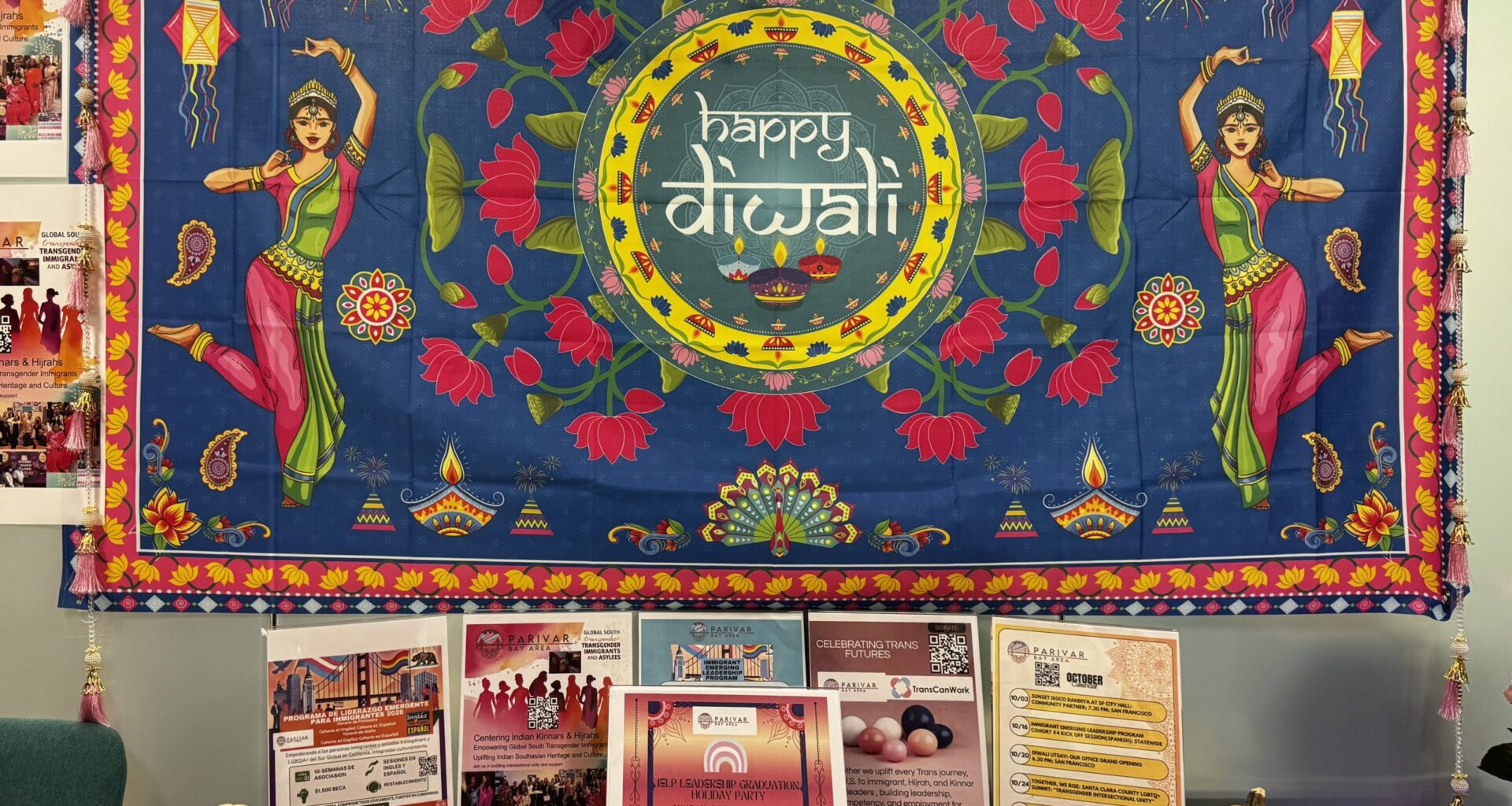
Sign up below to get Mission Local’s free newsletter, a daily digest of news you won’t find elsewhere.
At a time when attacks on the rights of transgender people across the U.S. have become commonplace, and during the very same week that Trump planned and called off a “surge” of federal immigration troops into San Francisco, Parivar, a local nonprofit, launched its first legal aid program for transgender immigrants.
Parivar, which means “family” in Hindi, has been serving the city’s South Asian queer immigrant community for six years. Founded by Anjali Rimi, a transwoman from Hyderabad in South India, Parivar raised over $200,000 to provide groceries and rent relief to LGBTQ+ people across the Bay Area, hosted public health initiatives like vaccination drives and trans support groups, and provided translators in Spanish, Hindi and other languages for trans asylum seekers.
On Monday Oct. 20, Parivar raised the ante, and announced a new partnership with Okan Law that offers discounted legal aid from attorneys well-versed in seeking asylum for gender-nonconforming individuals. Okan will have a space on-site at the new location to meet with potential and current clients.

Want the latest on the Mission and San Francisco? Sign up for our free daily newsletter below.
Parivar’s announcement coincided with the opening of the nonprofit’s first brick-and-mortar space at 837 Turk Street. Honey Mahogany — who directs San Francisco’s Office of Transgender Initiatives, was there. So was D8 Supervisor Rafael Mandelman, as well as representatives from Mayor Lurie, Assemblyman Matt Haney and D5 Supervisor Bilal Mahmood’s offices.
 Ribbon cutting ceremony at Parivar’s new office. From left to right, MacKenzie Ewing, Moisés Garcia, Anjali Rimi, Honey Mahogany and Rafael Mandelman. Photo by Anusha Subramanian.
Ribbon cutting ceremony at Parivar’s new office. From left to right, MacKenzie Ewing, Moisés Garcia, Anjali Rimi, Honey Mahogany and Rafael Mandelman. Photo by Anusha Subramanian.
A week later, the program had already received 17 inquiries and taken on two new asylum cases.
Legal fees for immigration and asylum applications can cost upward of $10,000, said Rimi, Parivar’s founder. Through the new program all immigrants can access legal support from the five attorneys at Okan Law at a 30 percent discount. Transgender immigrants or asylum seekers will have an additional stipend of up to $1,500 to help mitigate attorneys’ fees, applications and other legal costs.
“We want to build the world’s largest family, centering unapologetically transgender people, transgender immigrants,” Rimi told the crowd gathered at the opening.
J Jha, a former board member of Parivar, recalled going through more than 20 for-profit and non-profit legal aid organizations before the Lawyer’s Committee for Civil Rights took their asylum case pro bono in 2014.
“First and foremost, transgender immigrants need a lawyer that they can afford to pay. That’s why programs like Parivar’s are important,” said Jha. “Otherwise your immigration application is dead in the water.”
A quarter of the country’s transgender immigrant population lives in California, with a majority in the Greater Bay Area, according to a study released in early 2024 by the Williams Institute, a think tank at UCLA Law.
It is not uncommon, said Rimi, for an immigration judge to disqualify an applicant for “misrepresentation” if, for example, their documents list them as male but they are a transgender woman.
Immigration courts often require transgender asylum seekers to prove that they are transgender, said Rimi. For example, they may ask a trans asylum-seeker for some medical evidence that they are trying to transition, like a prescription for hormone replacement therapy. But rules that narrow don’t apply to the complex lives of asylum-seekers, or the realities of the countries they are trying to escape, said Rimi. The United States requires asylum seekers to prove they cannot return home for fear of legal persecution— but that fear of legal persecution also means that trans asylum seekers can arrive in the U.S. without the kind of paper trail that an immigration judge is looking for.
Immigration lawyers who understand the transgender experience can help explain such circumstances to the asylum court, increasing the chances of a positive decision, said Rimi.
Rimi, now 45, knows the stakes firsthand. She had been grappling with her gender identity since her teenage years but when she moved to the United States in 2001, to pursue an MBA from Boise University, Idaho, she hadn’t transitioned.
Years later, working in a management role at a supply chain company in the Bay Area (Rimi declined to identify the company) she built up the courage to try. She began hormone therapy, but when her employer found out, he said he wouldn’t let Rimi do “all these types of things” and moved to revoke her work visa, effectively ending her ability to live in the U.S. until she could find another employer to sponsor her visa.
“Nobody told me that I could have applied for asylum in the United States,” said Rimi. Her family in India would not accept her transgender identity, she said. “I was experiencing homelessness and statelessness.”
Disheartened, Rimi moved to Canada. Eventually, she was able to return to the United States under a different work visa. She became a legal permanent resident in 2012, and a citizen in 2019 — the year she started Parivar.
Earlier on, the goal of Parivar was to uplift Rimi’s community of Kinnar and Hijrah immigrants, a group of South Asian nonbinary people who often face severe discrimination and abuse in their home countries because of their gender identity.
From that beginning, Parivar’s advocacy has expanded to the larger South Asian queer community as a whole. Parivar helped pass legislation declaring Diwali, a major Indian festival, a state holiday in California. Gov. Gavin Newsom signed the bill into law on Oct. 6, 2024, making California the third state in the country to recognize Diwali.
At the ribbon-cutting ceremony outside of the new Turk Street office, Moisés Garcia, a representative from Mayor Daniel Lurie’s office, presented Parivar with a mayoral proclamation declaring Oct. 20 “Diwali Day” in the City of San Francisco. The Board of Supervisors unanimously passed a county resolution the next day affirming this.
Combining legal help with nourishment and celebration of the community is crucial, said Jha. “Oppression not only inhibits freedom, but also suffocates the imagination.”
The Turk Street space, colorfully decorated with posters of Parivar initiatives and South Asian art, will serve as the group’s headquarters and a place for events, panels, and celebrations.
“That is trans joy – enduring the most difficult situations and still having a big heart,” Rimi told Mission Local. “It’s important to propel that joy forward.”
We’re more than halfway there!
We’ve raised 2/3 of our $300,000 goal to cover immigration for the next three years of Trump’s term! More than 500 of you have stepped up since September — an incredible feat of community support.
We are humbled. We still have a bit to go: Donate below if you want to keep Mission Local in the courts, reporting on ICE’s actions in San Francisco.
